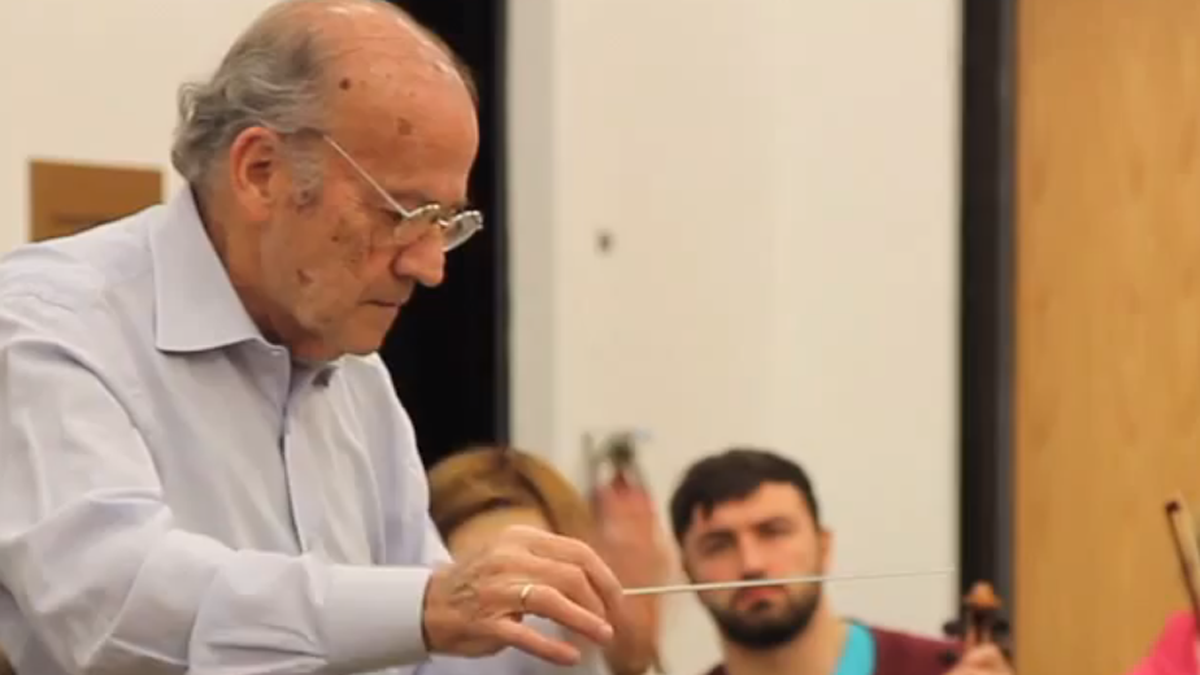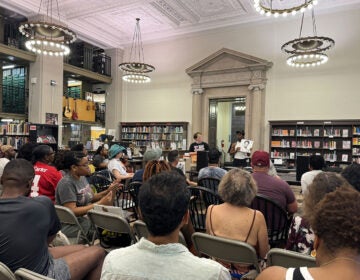After three decades of teaching ‘secrets of the sound,’ Temple orchestra maestro stepping down

In 1968, Luis Biava won a position in the violin section of the Philadelphia Orchestra under then-conductor Eugene Ormandy. (Kimberly Paynter/WHYY)
One of Philadelphia’s musical giants is bowing out.
After 28 years, Luis Biava will step down as artistic director of the Temple University Symphony Orchestra in June. This weekend he will make his final Kimmel Center appearance as the orchestra’s director.
Mahler’s First Symphony is one of Biava’s favorites, but one that is hard to pull off at the college level because it requires so many strings. Most university orchestras don’t have the 50 or 60 capable string musicians to give Mahler his due.
“When I came, it was not bad, but the amount of people it requires for a symphony orchestra is so much better now,” said Biava. “We always had good brass. Now we have good strings.”
The son of a clarinetist, Biava grew up in Colombia where he became a concertmaster and associate conductor. In 1968, he won a position in the violin section of the Philadelphia Orchestra under then-conductor Eugene Ormandy, who ruled with an iron hand.
“I heard from colleagues: ‘Biava, never speak about conducting in this orchestra,'” he said. “And I never did. Honest truth. Nobody believes me because everybody wants to be a conductor.
“No. I was very happy. I was the first Latin American to move into a big orchestra in the states,” he said. “To me, it was a great achievement to be in Philadelphia.”
Biava happily played violin in the Philadelphia Orchestra, taught violin at Temple University, and picked up conducting gigs around the world. Then, after 26 years, the Philadelphia Orchestra called him and asked if he would take the podium. By then, he was already artistic director of the Temple University Symphony Orchestra, which he would ultimately lead to three Grammy nominations.
“For me, it was the sound of the Philadelphia Orchestra,” said Biava. “I worked with that. I experienced that, so I pass it to my students.”
Thousands of musicians have passed under Biava’s baton, many going on to successful musical careers.
Paul Cigan played under his baton from 1988 to 1992, and is now the principal clarinetist at the National Symphony Orchestra in Washington, D.C.
“He had this combination of being intimidating — and being fatherly and welcoming at the same time,” said Cigan. “Intimidating, in a good way. It was his musical knowledge. He had such a depth that I had never seen before, ever, or been in contact with.”
Biava deflects some of the credit his students give him, deferring to his own father, an Italian who moved to Colombia as an adult, and founded the first opera company in the city of Barranquilla.
“Growing up with this feeling of adventure, to me it was a great help,” said Biava.
The concert this weekend at the Kimmel Center is ostensibly his last, but Biava never says never. He still plans to guest-conduct when he can, and if he can’t, he can still teach.
“We musicians, we are never happy. We try to achieve more and more. This is what I’ve seen in my father,” said Biava. “Teaching is something so beautiful. To give them secrets of the bow arm, the sound, the musicality. You can teach. Music is — how do you say? — infinita in Spanish. It never ends.”
Temple’s Boyer College of Music and dance has been actively seeking Biava’s replacement for several months and expects to announce him or her this summer.
WHYY is your source for fact-based, in-depth journalism and information. As a nonprofit organization, we rely on financial support from readers like you. Please give today.





